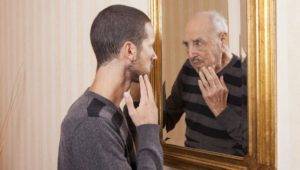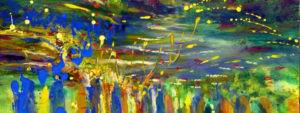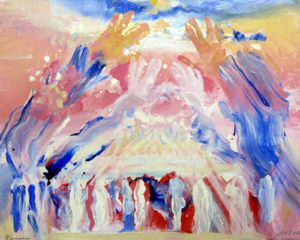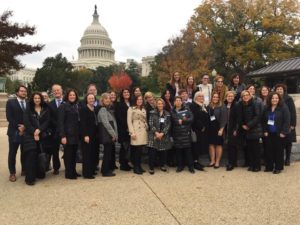I live between the Holy and Profane
a moving song that describes the space we find ourselves A song that helps us understand the need for the sacred protective space that is Shabbat.
Shabbat Shalom.
(The English lyrics are below the song. )
I live between the Holy and Profane
a moving song that describes the space we find ourselves A song that helps us understand the need for the sacred protective space that is Shabbat.
Shabbat Shalom.
(The English lyrics are below the song. )
The courage of our young people is a source of hope. Gen Z, which includes many professional athletes, are stepping up to fight against injustice.
By the Rivers of Babylon sung by Rocky Dawuni – Playing for Change
This Shabbat, May the words of my mouth and the meditations of my heart be acceptable to You.
Shabbat Shalom
 Like so many, I am frustrated. In large measure, I am frustrated with myself. It is me who needs the work. Privilege, whiteness, racist and similar words or phrases can be jingoistic, masquerading in a cloak of empathy. They really have no weight until I confront who I am with honesty and vulnerability. I have struggled with what I can only describe as our own hypocrisy; far too often we preach and we teach, but we do not fully live the Jewish values we espouse. How could this not be at the forefront of everything I do for as long as I have been doing it? What took me so long, why now? I think back at those interesting words at the beginning of Exodus: And God heard their cry and remembered the Covenant God made. What took God so long? There were 400 years of suffering and oppression. What took God so long?
Like so many, I am frustrated. In large measure, I am frustrated with myself. It is me who needs the work. Privilege, whiteness, racist and similar words or phrases can be jingoistic, masquerading in a cloak of empathy. They really have no weight until I confront who I am with honesty and vulnerability. I have struggled with what I can only describe as our own hypocrisy; far too often we preach and we teach, but we do not fully live the Jewish values we espouse. How could this not be at the forefront of everything I do for as long as I have been doing it? What took me so long, why now? I think back at those interesting words at the beginning of Exodus: And God heard their cry and remembered the Covenant God made. What took God so long? There were 400 years of suffering and oppression. What took God so long?
It does not assuage my guilt to take solace in the human time it took God. Despite knowing I cannot change the past, I struggle with how I affect the future. This only adds to the frustration of knowing I have not done enough to bring us farther along. And do I really believe in what I proclaim?
Do I have the fortitude and courage to look deep within and grapple with who I am and what I must do to change? Only then will I be whole enough to join in the battle that our society and humanity as a whole must wage to create the world I profess to believe in. Will I cross over or find contentment on this side in my narrow but for the most part comfortable space.
We have had opportunities before. We have moved forward, slowly, haltingly, stumbling often one step forward and two steps back. In actuality, we have lived with the opportunities to make change continuously. What makes this moment different? Will I be like Nachshon, wading deliberately into the unknown Sea of Reeds or be one of those longing for the land of Goshen, that narrow harsh place, whose evils are known but tempered by our thoughts of powerlessness?
Prescriptions are being bandied about. Some might be curative and others little more than a bandage. Everywhere there are now lists of things proposing changes ostensibly serving to right society’s wrongs. How could these lists be created so quickly? Seeing these in the immediate aftermath of George Floyd’s murder makes me wonder if the answers been known all along. This would imply either the problem is not that complicated or we did not have the strength to enact these prescriptions. We need to ask ourselves which it is. Or is the problem so deep and thorny as to render it all but impossible to unravel? And we have left the status quo because we are overwhelmed at the enormity of the issue. At this moment in time are we willing to find out? Will this time different from all of the other times? Am I up to the challenge?
One Day…
Behar-Bechukotai

Have you ever taken a vacation?
Usually, it is for one of two reasons:
To see or experience something new, or to Rest and relax (and of course some of us combine these). Both are ways to recharge to have a reset, time away from the normal and challenging tasks of work to engage in shavat v’yinafash, resting and refreshing both the body and the soul.
This week׳s Torah Portion Parsha Behar-Bechukotai talks about a reset- The Shmita -a reset of the land. Every seven years we are supposed to stop tilling the soil to let the fields recharge and all people regardless of stature; resident, worker, and slave alike, even the animals, get to partake equally in what is there.
We let things lie dormant so they can be rejuvenated.
The land is recharged and also not uncoincidentally those who do the hard physical labor of farming are given a respite as well. We do this for seven cycles of seven years and then in the 50th year is the Jubilee. “And you shall sanctify the fiftieth year, and proclaim freedom for slaves throughout the land for all who live on it. It shall be a Jubilee for you, and you shall return each man to his property, and you shall return each man to his family.”(Lev 25:10)
What might we learn from such a giant reset?
Our tradition recognizes that there are imbalances in the system- imbalances inherent in all systems. Some people are more successful in acquiring things, in working skillfully or even artfully, some possess better business acumen, some are particularly adept in choosing the right parents perhaps. And then, there are those not so skilled. The Talmud extensively discusses the issue that “Batar Anya Azla Aniyuta,” or “poverty follows the poor” or that Poverty actually increases from being impoverished.
All societies naturally tend towards these proclivities, and it is up to us, those who can make a difference, to make a change. To reset society to align with our values and principles. Another example of such a reset is commemorated at this time in our calendar.
As we mark the 34th day of our trek to Sinai the story of Shimon Bar Yochai is also worth noting. A disciple of Rabbi Akiva, he and his son, Eleazar, fled to escape the Romans, living in a cave for 12 years. He emerged but instead of re-joining his community, he was disgusted by a perceived lack of piety by the people. Shimon’s eyes burned everything they saw to a cinder, field and man, alike. God’s messenger, The Bat Kol, sent him back to the cave for another year and he emerged an enlightened man dedicated to righteous living and scholarship, redeeming Tiberias and possibly laying the groundwork for writing the seminal book of Jewish Mysticism, the Zohar.
This is the charge of this week’s Parsha- for each of us individually to rededicate ourselves to serving the needs of our people compassionately and deliberately, fully committed to the sacred cause of living Jewishly if we are willing to take up the challenge.
When this health emergency is past, will you emerge hardened from the cave? Or will you emerge from this quarantine open and deeper in touch with the values that are there to guide you? Or, will you figuratively burn what you see to the ground by turning a blind eye towards the deep injustices and needs that exist, or instead, will you choose to engage in pursuing righteousness and Jewish values, treating the people with Tzedek and compassion?
Which path will you choose?
May you choose to walk the Jewish path
Cain Yehi Ratzon,

The Priestly Blessing is a message of hope in a troubled world. We have long wondered about the Priestly Blessing being placed in Parshat Naso. Many have posited it was out of place, belonging instead in Leviticus (9:22) when Aaron is told to bless the people. But I believe it is placed here purposefully as a message of assurance, to make sure we understand how important we are to each other and to the Almighty.
Naso contains a census of the Tribe of Gershon, the extraordinary stories of the Sotah, a test for the unfaithful wife, and the issues surrounding the intense vows of becoming a Nazirite. And only then do we read the Priestly Blessing; The three-line expansive blessing upon each of us that God protects us, is kind to us, and grants peace to us. It is actually the perfect response to the perplexing and difficult issues that preceded.
We are told we count. That was central in the previous Parsha, BeMidbar, and reiterated as the census to count the Gershonites. But then we are confronted with the Sotah and the Nazirite, as if to ask are there times when we do not count. We all struggle with life. We seek God’s blessings, we seek meaning, we seek good things, namely peace and a good life. But we find ourselves going off the rails. When this happens are we cut off from God’s blessing?
The Sotah is about accusations of infidelity. But in the absence of anything but circumstantial evidence, the magical test is administered by the Priest. The gravitas of this must be overwhelming. But even if a woman survived the test, would her husband fully welcome her home, without harboring some suspicions. Would trust ever be restored fully? Would others in the community maintain lingering doubts, rumors, and stories placing an indelible stain on the woman’s reputation?
Someone taking the vow of a Nazirite may do it for lofty purpose, but based on our understanding of the things that motivate such action, we see the wisdom of Gersonides’ analysis that, A person takes such a vow to silence the unhealthy turmoil inside a person arising from a physical desire that might lead one to sin. Does the person who needed to take the Nazirite vow feel rejuvenated or reborn when the vow is complete? Does the thing that required such focus continue to linger in their souls? Such impulses can extend beyond lust to other impulses that can plague us emotionally or spiritually.
The Priestly Blessing is deliberately and thoughtfully placed here to say we struggle and we continue to struggle. It comes at us from all angles. It is part of being human in a world that is often fraught and difficult. Each of us has a struggle, a demon, a bad action, a feeling of inadequacy. It is part of who we are as human beings.
The Priestly Blessing is a wish for wholeness, a wish for Peace in an unpeaceful world. The Priestly Blessing is a wish for Peace; it is our yearning that these struggles do not mire us in a life that feels dark or hopeless. It is the profound hope that God is there to love and protect us even when we feel we have strayed so far away that we are beyond the reach of even the Almighty’s loving protective wings of peace.
Hope remains. God is there. We are not alone.
May the Almighty Bless you and Protect you.
May the Almighty deal kindly and graciously with you.
May the Almighty bestow Divine favor upon you, granting you wholeness and peace.
Shabbat Shalom.
Rabbi David Levin is a second career rabbi. Trained at Hebrew Union College-Jewish Institute of Religion, Rabbi Levin’s rabbinate focuses on outreach to seekers of meaning, bringing Jewish Wisdom to their life journey. Rabbi Levin’s work is trans-denominational, embracing and drawing knowledge from all aspects of Judaism. He is a member of the CCAR (Reform Rabbinical Association), OHALA (Renewal Rabbinical Association), NAJC (Neshama, Association of Jewish Chaplains), a Fellow of Rabbis Without Borders, serves on the regional board of NIF (New Israel Fund), and is a volunteer on the Disaster Spiritual Care Team of the American Red Cross.
Rabbi Levin currently teaches The Ethical Will Re-Imagined, as well as Mussar at the Jack M. Barrack Hebrew Academy, Introduction to Judaism for the URJ, “Kavod v’Nichum, Understanding Jewish end-of-life rituals”, and the acclaimed series “L’Chaim, Jewish Wisdom for the End of Life Journey” with two esteemed rabbinic colleagues. Rabbi Levin officiates in complex lifecycle events including non-traditional burial and work with interfaith couples. Rabbi David leads interfaith trips to Israel through the CLAL Stand and See project. Rabbi Levin is the organizer of Death Café of Greater Philadelphia
We have seen the enemy and he is us. So were the immortal words of the great American philosopher Pogo, the satirical cartoon creation of Walt Kelly. That droll quip speaks to a dark sinister reality about what is happening in the Jewish world, in direct contrast to the warning offered by Parshat Tzav.
God directs Moses to command the priests on what to do and how to do it as they fulfill their sacred responsibilities on behalf of the people Israel. It is clear that the sacred tasks require special ways of acting. There is too much at stake; for these are the priest making offerings to God on behalf of God’s people. The priest learn the strict code to which they must adhere. Deviating is not acceptable, and the consequences can be severe, as Nadav and Abihu will learn.
Later on, we learn that the nation itself is a nation of priests. That we as a nation are similarly charged with a series of behaviors that are required of us to fulfill our responsibilities. These laws are put forward in Torah and then developed by the rabbis and shared in the Oral Torah and the great works that expound upon these laws. Like our priestly class, the nation of Israel is bound to the laws of Torah on how to act in order to fulfil our sacred responsibilities of being a light to the nations.
That light has been dimming as a result of a move away from our role as faithful servants to something that embodies a hubris endangering and attacking our core values as a people. We have moved from the sacred work of Sanctifying God’s name to profaning God’s name, from Kiddush ha-Shem to Hillul ha-Shem.
At the most recent Rosh Chodesh at the Kotel we witnessed a brutal and tragic display of violence against the Women of the Wall. We do not agree on how we should engage in ritual. I respect other approaches to Judaism, even though I do not practice them. Likewise, there are many who would see my religious practice as unacceptable. However deep the disagreements may be, there is no justification for the violence perpetrated on the Women at the Kotel. I would argue that the shouting is an undermining of the special space that is the Kotel and place. But physical battery is blasphemy, plain and simple. It curses God’s name and everything that Judaism is supposed to represent. In the name of the sacred, everything sacred has been trashed, God’s great name was trampled in the mud. The violent encounter was in violation of all of Jewish Law and culture. This moment is a tipping point for us as a people. And this is not the only arena where our behavior needs to be critically examined. Tzav, commanded behaviors, require adherence to standards of decency and ethics. Are we acting as God has directed?
There is a rise in racism in Israel is an insidious cancer eating away at the very soul of the State. This racism dehumanizes the non-Jew, whether they be citizens of Israel or Palestinians of the West Bank and Gaza. The inability to see the other as one with fundament human and civil rights, entitled to dignity and respect, undermines the ideals of both the Jewish State and the Jewish religion.
The violent racist Kahanists, Otzmah Yehudit, have a new-found acceptance in Israeli politics. The inclusion of these group dedicated to an extreme racist view, enforced by thuggery, should be unthinkable, but instead of repudiating them and everything they stand for, they are legitimized and welcomed. There are appeals to the courts seeking redress, but ultimately the Israeli people must speak out unequivocally against this base and baseless hatred.
This issue also confronts American Jewry. As anti-Semitism is on the rise, American Jews must respond. The manner in which we move forward will determine if we are no better than those who hate us. Can we be strong and resolute without resorting to similar tactics as those whose ideas we find dangerous and contemptible? Can we find sufficient security in this extraordinary place and time in our history to battle anti-Semitism and not feel disenfranchised by those contemptible people on the margins of society who seek to do us harm?
The second temple was destroyed, our sages say, due to Sinat Chinam, the baseless internecine warfare that existed within the Jewish people. Instead of a tolerant society with many different interpretations of Judaism, the People of Israel became a fractious group of competing sects intent on imposing their particular view on everyone, ultimately sacrificing everything. Can we reclaim the ideals of Klal Yisrael, or is history repeating itself?
Our leaders from across the breadth of our tradition including Rabbi Nachman the Hasidic master, Rav Kook the founder of religious Zionism, and Rabbi Abraham Heschel an American Prophetic voice, to name only three, all warned against hatred against others, no matter how deeply offensive we might find certain practices. They encouraged us to embrace the best of our tradition so that we may bring forward our values in the world. Tzav as part of the book of Leviticus, as part of Torah, lays out the rules for how to act as a people in sacred service to God. These rules are based on core values that are central to every expression of Judaism, religious, ethnic, and cultural. When we violate the values that are at our core, we betray the sacred aspirations of our tradition. Tzav reminds us of our duties and sacred obligations and admonishes us not to stray. Tzav demands more of us, we need to take heed and act better.
A person should drink on Purim until the point where he can’t tell the difference between “Blessed is Mordechai” and “Cursed is Haman. (Talmud – Megillah 7b) “Ad d’lo yada…”
Why do we drink so that we can no longer distinguish between the “Blessed” Mordechai and the “Cursed” Haman? Perhaps because in this world of Purim where things are turned upside down, the two men had changed places and toward the end of this story, it is impossible to distinguish between them. And this serves as a warning for us to take great care in how we act. The rabbis are admonishing us that underneath this story of triumph and joy lies an ominous message.
Towards the end of the Megillah, the story takes a dark turn. Briefly, the Jews are saved, Haman is hanged. The King grants the Jews permission to annihilate anyone that poses a threat to them, including women and children and to plunder their possessions. Mordechai methodically plans the Jew’s revenge; and the oppressor becomes the victim as the Jews dominate their enemies. First in Shushan, the Jews killed 500 men and Haman’s 10 sons, then another 300 were killed, and then across the kingdom the Jews proceeded to kill seventy-five thousand more. The death and destruction recounted is dreadful. Jews slaughtering in retribution are as horrible as those actions Haman had planned. Mordechai accomplishes what Haman had plotted.
We are admonished to destroy the Amalekite, and Haman is a descendant of Amalek himself. But if we annihilate the enemy, even one who planned to annihilate us, aren’t we just as guilty of murder and bloodshed? It is not only the Amalek who lives as another that should concern us; A piece of Amalek lives inside all of us, call it the yetzer hara, or inclination toward evil. Our yetzer tov, or inclination toward good, is always in competition with it. Purim asks which of these will prevail in our lives? At its core, the destruction of Amalek and the story of Purim are existential questions of our humanity.
And perhaps that is why we drink to oblivion. Usually, we drink wine as a symbol of our joy. But drinking to excess is something else entirely. Heavy drinking is a form of self-medicating. Drinking until losing rational senses is drinking to forget. We drink heavily to escape the brutal reality. Although our people were saved, we committed atrocities- not as a crime of passion, but a deliberate plot to methodically exterminate tens of thousands of people. We drink to forget our shame and horror at what we had done.
To underscore this grave situation, the Gemara on Megillah 7b continues with the bizarre story of Rabba and Rabbi Zeira, where in a drunken stupor, Rabba slaughtered his dear friend Rabbi Zeira. Otherwise good people can do profoundly terrible things. This is what can happen when you lose control, when you lose sight of what is right, betray your core and operate in the absence of God (it is noteworthy that Megillat Esther does not mention God). And it is precisely here that the rabbis insert God back into the discussion as Zeira is resurrected after Rabba beseeches God to intervene and set right what Rabba had destroyed.
When we arise from our stupor, we have a hangover; a brutal headache from the excesses of the night before. We know that a hangover is an indication of dehydration, a lack of water , which further intensifies the message. Water is a metaphor for Torah, and maybe it is the lack of Torah that permitted the carnage.
Megillah Esther warns us to be very careful. The Megillah cautions us to not become “like them” and react to extract revenge, sacrificing both them and our humanity. Megillat Esther challenges us instead to rise up with dignity and respect, embracing the values that have made Judaism the extraordinary gift to the world that it is.
Purim is a layered complicated story filled with cause for celebration and sorrow and an profound admonitory note to soberly review who we are.
This weekend is an extraordinary confluence of memories and events that I pray leads to our rededication to the values we cherish as a nation and as Jews. Kristallnacht and Veteran’s Day are times of extraordinary solemn remembrance. The lessons we learn from these can shape our commitment to the world we seek to achieve.
November 9 marks the anniversary of Kristallnacht, Nazi Germany’s great pogrom and genocide against the Jewish people. The oppression and persecution of the Jews of Europe entered a new and deadlier phase bringing the long-simmering anger and aggression out into the open as Goebbels encouraged mass arrests, violence against Jews and any visible signs of Jewishness, including synagogues, stores, and our sacred texts.

November 11 marks Veteran’s Day, the time we honor those who have bravely fought to preserve, protect, and defend our country and the values we represent. Eventually, these men and women fought against the Nazi’s tyrannical regime built on hate but sadly too late to rescue the 6 million Jews slaughtered.
 And yesterday, November 9, I was proud to accompany the Women’s Philanthropy Division of the Jewish Federation of Greater Philadelphia on a trip to Washington, DC to advocate both in Congress and the White House for DACA, Responsible Gun Legislation, Food Insecurity and the SNAP program, and against BDS and Anti-Semitism. We championed our values and spoke truth to power with persuasive force and civility.
And yesterday, November 9, I was proud to accompany the Women’s Philanthropy Division of the Jewish Federation of Greater Philadelphia on a trip to Washington, DC to advocate both in Congress and the White House for DACA, Responsible Gun Legislation, Food Insecurity and the SNAP program, and against BDS and Anti-Semitism. We championed our values and spoke truth to power with persuasive force and civility.
The struggle to realize a better kinder nation and world continues. Yasher Koach and most profound gratitude to all of those who join the fight.
Shabbat Shalom.